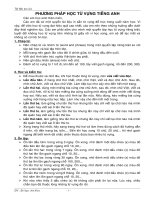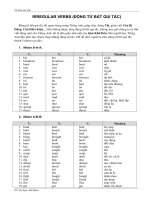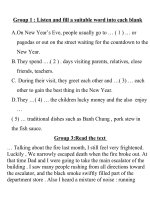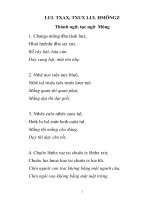Tài liệu tham khảo tiếng Anh 11 hk2
Bạn đang xem bản rút gọn của tài liệu. Xem và tải ngay bản đầy đủ của tài liệu tại đây (298.43 KB, 25 trang )
Tài liệu sưu tầm
IRREGULAR VERBS (ĐỘNG TỪ BẤT QUI TẮC)
Động từ bất qui tắc rất quan trọng trong Tiếng Anh, giúp chia đúng Thì, giúp viết Câu Bò Động,
Câu Điều Kiện,… Nếu không thuộc lòng động từ bất qui tắc, không bao giờ chúng ta có thể viết
đúng một câu Tiếng Anh, dù là đơn giản như một câu Quá Khứ Đơn. Mọi người học Tiếng Anh đều
phải học thuộc lòng những động từ này. Để dễ nhớ, người ta chia động từ bất qui tắc thành 5 nhóm
sau đây:
1. Nhóm A-A-A:
V
1
V
2
V
3
Meaning
1. bet
2. broadcast
3. burst
4. cast
5. cost
6. cut
7. forecast
8. hit
9. hurt
10. let
11. put
12. quit
13. read
14. set
15. shut
16. spread
17. thrust
bet
broadcast
burst
cast
cost
cut
forecast
hit
hurt
let
put
quit
read
set
shut
spread
thrust
bet
broadcast
burst
cast
cost
cut
forecast
hit
hurt
let
put
quit
read
set
shut
spread
thrust
cá độ
phát thanh
nổ
ném
trị giá
cắt
dự báo
đánh, đụng
làm tổn thương
để cho
đặt, đ ể
bỏ, thơi
đọc
đặt, vặn lại, thiết lập
đóng lại
trải ra
đâm
2. Nhóm A-B-B:
V
1
V
2
V
3
Meaning
1. bend
2. bind
3. bleed
4. bring
5. build
6. burn
7. buy
8. catch
9. creep
10. deal
11. dig
12. dream
13. dwell
14. feed
15. feel
16. fight
17. find
18. flee
19. get
bent
bound
bled
brought
built
burnt
bought
caught
crept
dealt
dug
dreamt
dwelt
fed
felt
fought
found
fled
got
bent
bound
bled
brought
built
burnt
bought
caught
crept
dealt
dug
dreamt
dwelt
fed
felt
fought
found
fled
got
bẻ cong
trói buộc
làm chảy m áu
mang lại
xây dựng
đốt cháy
mua
bắt
bò
đối xử, xử lý
đào
mơ, chiêm bao
cư trú
cho ăn
cảm th ấy
đánh nhau
tìm được
chạy trốn
nhận, lấy được
GV: Su Ngoc Anh Khoa
Tài liệu sưu tầm
20. grind
21. hang
22. have
23. hear
24. hold
25. keep
26. lay
27. lead
28. lean
29. learn
30. leave
31. lend
32. light
33. lose
34. make
35. mean
36. meet
37. pay
38. say
39. seek
40. sell
41. send
42. shine
43. shoot
44. sit
45. sleep
46. smell
47. speed
48. spell
49. spend
50. spill
51. spoil
52. stand
53. stick
54. sting
55. strike
56. sweep
57. swing
58. teach
59. tell
60. think
61. understand
62. weep
63. win
ground
hung
had
heard
held
kept
laid
led
leant
learnt
left
lent
lit
lost
made
meant
met
paid
said
sought
sold
sent
shone
shot
sat
slept
smelt
sped
spelt
spent
spilt
spoilt
stood
stuck
stung
struck
swept
swung
taught
told
thought
understood
wept
won
ground
hung
had
heard
held
kept
laid
led
leant
learnt
left
lent
lit
lost
made
meant
met
paid
said
sought
sold
sent
shone
shot
sat
slept
smelt
sped
spelt
spent
spilt
spoilt
stood
stuck
stung
struck
swept
swung
taught
told
thought
understood
wept
won
xay, nghiền
treo
có
nghe
cầm
gi ữ
đặt, để
dẫn d ắt
dựa
học
để lại, rời khỏi
cho mư ợn
thắp sáng
mất, thua
chế tạo, sản xuất, làm
có nghĩa là
gặp
trả ti ền
nói
tìm, kiếm
bán
gửi
chiếu sáng(m ặt trời)
bắn, sút bóng
ngồi
ngủ
ngửi
v ượt nhanh
đánh vần
tiêu xài, trải qua
làm đổ
làm hỏng
đứng
dán dính
chích
tác động
quét
đu đưa
dạy
kể, bảo
suy nghĩ
hiểu
khóc thầm
chiến thắng
3. Nhóm A-B-A:
V
1
V
2
V
3
Meaning
1. become
2. come
3. run
became
came
ran
become
come
run
trở thành
đến
chạy
4. Nhóm A-A-B:
GV: Su Ngoc Anh Khoa
Tài liệu sưu tầm
V
1
V
2
V
3
Meaning
Beat beat beaten Đánh, đập
5. Nhóm A-B-C:
V
1
V
2
V
3
Meaning
1. be
2. bear
3. begin
4. bite
5. blow
6. break
7. choose
8. do
9. draw
10. drink
11. drive
12. eat
13. fall
14. fly
15. forbid
16. foresee
17. forget
18. forgive
19. go
20. grow
21. hide
22. know
23. lie
24. mistake
25. ride
26. ring
27. rise
28. see
29. shake
30. show
31. sing
32. sink
33. speak
34. spring
35. steal
36. swim
37. take
38. tear
39. throw
40. undertake
41. wake
42. wear
43. withdraw
44. write
was/were
bore
began
bit
blew
broke
chose
did
drew
drank
drove
ate
fell
flew
forbade
foresaw
forgot
forgave
went
grew
hid
knew
lay
mistook
rode
rang
rose
saw
shook
showed
sang
sank
spoke
sprang
stole
swam
took
tore
threw
undertook
woke
wore
withdrew
wrote
been
born
begun
bitten
blown
broken
chosen
done
drawn
drunk
driven
eaten
fallen
flown
forbiden
foreseen
forgotten
forgiven
gone
grown
hidden
known
lain
mistaken
ridden
rung
risen
seen
shaken
shown
sung
sunk
spoken
sprung
stolen
swum
taken
torn
thrown
undertaken
woken
worn
withdrawn
written
là, thì. ở
sinh ra, chịu đựng
bắt đầu
cắn
thổi
làm vỡ, gãy, vi phạm
lựa chọn
làm
vẽ, kéo
uống
lái xe hơi
ăn
rơi, ngã
bay
cấm
đoán trước, tiên tri
quên
tha th ứ
đi
mọc, trồng
giấu, trốn
biết
nằm
nhầm, lầm
cỡi(ngựa, xe đạp)
reo chuông
tăng lên
thấy, gặp
lắc, rung
chỉ cho thấy
hát
chìm tàu
nói
nhảy chồm lên
ăn cắp
bơi
cầm, lấy
xé rách
ném
đảm nhiệm
đánh thức
mặc, đội, mang. đeo
rút
viết
GV: Su Ngoc Anh Khoa
Tài liệu sưu tầm
UNIT 9: THE POST OFFICE (BƯU ĐIỆN)
A. NEW WORDS:
1. daily
2. equip
3. advanced
4. technology
5. spacious
6. pleasant
7. front
8. service
9. a well-trained staff
10.thoughtful
11.courteous
12.customer
13.parcel
14.surface
15.express mail
16.deliver
17.competitive rate
18.transfer
19.imagine
20.speedy
21.secure
22.besides
23.notify
24.recipient
25.receive
26.document
27.original
28.facsimile
29.transmission
30.convenient
31.transmit
32.graphic
33.distance
34.press distribution
35.bother
36.subscribe
37.favourite
/ 'deili/
/ i'kwip/
/ əd'vɑ:nst/
/ tek'nɔlədʒi/
/'spei∫əs/
/ 'pleznt/
/ frʌnt/
/ 'sə:vis/
/ 'θɔ:tfl/
/ 'kə:tjəs/
/ 'kʌstəmə/
/ 'pɑ:s(ə)l/
/ 'sə:fis/
/ iks'pres meil/
/ di'livə/
/ kəm'petitiv reit/
/ 'trænsfə:/
/ i'mædʒin/
/ 'spi:di/
/ si'kjuə/
/ bi'saidz/
/ 'noutifai/
/ ri'sipiənt/
/ ri'si:v/
/ 'dɔkjumənt/
/ ə'ridʒənl/
/ fæk'simili/
/ trænz'mi∫n/
/ kən'vi:njənt/
/ trænz'mit/
/ græfik/
/ 'distəns/
/ pres ,distri'bju:∫n/
/ 'bɔđə/
/ səb'skraib/
/ 'feivərit/
(adj)
(v)
(adj)
(n)
(adj)
(adj)
(n)
(n)
(exp)
(adj)
(adj)
(n)
(n)
(n)
(exp)
(v)
(exp)
(v)
(v)
(adj)
(adj)
(adv)
(v)
(n)
(v)
(n)
(adj)
(adj)
(n)
(adj)
(v)
(adj)
(n)
(exp)
(v)
(v)
(adj)
1. ………………………………….
2. ………………………………….
3. ………………………………….
4. ………………………………….
5. ………………………………….
6. ………………………………….
7. ………………………………….
8. ………………………………….
9. ………………………………….
10.………………………………….
11.………………………………….
12.………………………………….
13.………………………………….
14.………………………………….
15.………………………………….
16.………………………………….
17.………………………………….
18.………………………………….
19.………………………………….
20.………………………………….
21.………………………………….
22.………………………………….
23.………………………………….
24.………………………………….
25.………………………………….
26.………………………………….
27. ………………………………….
28.………………………………….
29.………………………………….
30.………………………………….
31.………………………………….
32.………………………………….
33.………………………………….
34.………………………………….
35.………………………………….
36.………………………………….
37.………………………………….
B. GRAMMAR:
GV: Su Ngoc Anh Khoa
Tài liệu sưu tầm
DEFINING AND NON-DEFINING RELATIVE CLAUSES
(MỆNH ĐỀ QUAN HỆ GIỚI HẠN VÀ KHÔNG GIỚI HẠN)
1. Definition
a. A defining adjective clause is one
that is necessary to identify the noun that it
modifies.
b. A defining clause provides
“essential” or “identifying” information and does
not require commas.
2. Examples
a. The professor who/that teaches
English 1101 is an excellent teacher.
b. The woman whom/that/ ø you met
at my party is a former astronaut.
c. The newspaper which/that is on
the table has an interesting article on polar bears.
d. The television show which/that/ ø I
watched last night was informative.
3. Explanation
a. The relative clauses in these
examples are essential in order to identify which
professor, which woman, which newspaper, or
which television show is meant.
b. Notice that defining (essential)
clauses can be introduced with that, who, whom,
or which and that the object pronoun can be
eliminated (ø) in examples b and d.
1. Definition
a. A non-defining clause is one that is
not necessary to identify the noun that it modifies.
b. A non-defining clause provides
additional, but “nonessential” information and
requires the use of commas.
2. Examples
a. Professor Hach, who teaches
English 1101, is an excellent professor.
b. Sally Ride, whom you met at my
party, is a former astronaut.
c. The Miami Herald, which is on the
table, has an interesting article on polar bears.
d. Dateline, which I watched last
night, was informative.
3. Explanation
a. The relative clauses in these
examples are not necessary to identify the nouns
that they modify. We know which professor,
woman, newspaper and TV show because they
have been identified by name, so the information
provided in the relative clause is additional or
nonessential.
b. Non-defining (nonessential) clauses
cannot be introduced with that, and the pronoun
object cannot be eliminated.
Remember the steps for changing sentences into relative clauses.
1. Find the noun or pronoun in the 2
nd
sentence that refers to the same noun in
the 1
st
sentence.
2. Choose the correct relative pronoun (who, whom, that, which, or whose).
3. Replace the noun in the 2
nd
sentence with the appropriate relative pronoun.
4. If necessary, move the relative pronoun to the front of the 2
nd
sentence.
5. Now you have a relative clause. Place the entire relative clause after the word in the 1
st
sentence.
C. EXERCISES:
I. Choose the word or phrase that best completes each of the following sentences:
1. This bed, _____ my grandfather used to rest on, is made of wood.
A. where B. which C. that D. B or C.
2. _____ that Columbus sailed to America.
A. It is in 1492 B. In 1492 C. It was in1492 D. That was in 1492
3. The reason _____ was that she had an important appointment with his manager.
GV: Su Ngoc Anh Khoa
Tài liệu sưu tầm
A. which he didn't come B. on which he didn't come
C. for that he didn't come D. he didn't come
4. _____ are his students' needs.
A. What the teacher must know B. Which the teacher must know
C. That the teacher must know D. The teacher must know
5. It doesn't matter _____ one says. _____ is important is the things _____ he does.
A. what - What - that B. what - Which - that
C. that - Which - that D. what - That - what
6. A higher crime rate exists in cites _____ a large percentage of the unemployed.
A. where have B. which have
C. that have D. B or C
7. _____ is that sitting over there in the corner?
(a) Who
(b) Whom
(c) Which
8. I don't understand a word ......... you are talking about.
(a) what
(b) that
(c) who
9. They have a very large house round ......... there are some lovely gardens.
(a) that
(b) which
(c) whose
10. I'm looking at the photograph ......... you sent me with your letter.
(a) which
(b) who
(c) whom
11. There is a new television programme called: '......... wants to be a millionaire?'.
(a) Which
(b) What
(c) Who
12. I think you will see that this is the best museum ......... you can find in the town.
(a) that
(b) which
(c) who
13. The police want to find out ......... drove the red car into the shop window.
(a) who
(b) who's
(c) whose
GV: Su Ngoc Anh Khoa
Tài liệu sưu tầm
14. Did you meet the lady ......... uncle works in the library?
(a) who
(b) whose
(c) who's
15. The person in the house next to mine knows someone ......... met the Queen.
(a) who
(b) whom
(c) which
16. The grass, ......... I cut every week, seems to grow very quickly.
(a) who
(b) who's
(c) which
II. Identify the underlined word or phrase - A, B, C or D - that must be changed for the
sentence to be correct
1. George refused telling us the reason why he didn't come to the class
A B C
meeting last week.
D
1. The car whose quality is very good has been used for a long time so far.
A B C D
2. The progress which made in space travel in the early 1960s was remarkable.
A B C D
3. A number of people who survived in the Titanic shipwreck in 1912 was quite small.
A B C D
III. Re write these sentences:
1. Mark bought a car. It cost $24,000.
_____________________________________________________________________________
2. I have a friend. He collects old coins.
_____________________________________________________________________________
3. The bloodhound is a dog. The dog has a keen sense of smell.
_____________________________________________________________________________
4. I know the professor. He wrote our textbook.
_____________________________________________________________________________
5. Here is the key. It opens the safe-deposit box.
______________________________________________________________________________
6. New York is a city. The city never sleeps.
_____________________________________________________________________________
7. Did you see the magician? The magician walks through walls.
______________________________________________________________________________
8. Have the police found the person? The person stole your car.
_____________________________________________________________________________
9. I have a photograph of my grandparents. The photograph was taken 60 years ago.
______________________________________________________________________________
10. I live next door to the man. He sold me my car.
______________________________________________________________________________
GV: Su Ngoc Anh Khoa
Tài liệu sưu tầm
11. James Bond was a spy. The spy worked for the British government.
______________________________________________________________________________
12. Mr. Emory is a man. He is well liked in the community.
______________________________________________________________________________
13. It is an idea. Its time has come.
______________________________________________________________________________
14. That's the author. His book has caused a great deal of controversy.
______________________________________________________________________________
15. I have a friend. His wife is from Egypt.
______________________________________________________________________________
16. My boss married a woman. Her cousin won the Nobel Prize.
______________________________________________________________________________
17. She was a teacher. Her methods were unorthodox but effective.
______________________________________________________________________________
18. My father gave me an old gold coin. Its value exceeded five hundred dollars.
______________________________________________________________________________
19. Mr. Randall gave a speech. Its topic was world peace.
______________________________________________________________________________
20. He was a gentleman. His eccentric conduct caused a great deal of talk among the townspeople.
______________________________________________________________________________
21. That's the woman. Her daughter won the spelling bee last week.
______________________________________________________________________________
22. Kevin has a dog. Its left hind leg has been amputated.
______________________________________________________________________________
23. Samantha likes the movies. Spielberg directs the movies.
______________________________________________________________________________
24. Tim took the dog. Richard didn't want the dog.
______________________________________________________________________________
25. Is this the letter? You wanted me to mail the letter.
______________________________________________________________________________
26. I like that British actor. You hate the actor.
______________________________________________________________________________
27. I have the same teacher. You had the teacher last semester.
______________________________________________________________________________
28. I bought the book. You recommended the book.
______________________________________________________________________________
29. I bought the car. My neighbor originally owned the car.
______________________________________________________________________________
30. We ate at the restaurant. The guidebook recommended the restaurant.
______________________________________________________________________________
31. He put the bottle in the bag. He was carrying the bag.
______________________________________________________________________________
32. I saw the man. The police are looking for the man.
______________________________________________________________________________
GV: Su Ngoc Anh Khoa
Tài liệu sưu tầm
UNIT 10: NATURE IN DANGER
(THIÊN NHIÊN GẶP NGUY HIỂM)
A. NEW WORDS:
38. the human race
39. species
40. exist
41. planet
42. human beings
43. the rest
44. environment
45. village
46. forest
47. affect
48. the water supply
49. agriculture
50. destroy
51. pollutant
52. respect
53. through
54. action
55. habit
56. result in
57. consequence
58. rare animal
59. as a result
60. decrease
61. rapidly
62. extinct
63. in order to + v
64. disappear
65. effort
66. protect
67. endangered species
68. organisation
69. set up
70. fund
71. raise
72. establish
73. prohibit
74. destruction
75. interference
76. survive
77. plant
78. peacefully
79. co-exist
/'hju:mən'reis/
/'spi:∫i:z/
/ig'zist/
/'plænit/
/'hju:mən 'bi:iη/
/rest/
/in'vaiərənmənt/
/'vilidʒ/
/'fɔrist/
/ə'fekt/
/sə'plai/
/'ægrikʌlt∫ə/
/di'strɔi/
/pə'lu:tənt/
/ri'spekt/
/θru:/
/'æk∫n/
/'hæbit/
/ri'zʌlt/
/'kɔnsikwəns/
/reə 'æniməl/
/'di:kri:s/
/'ræpidli/
/iks'tiηkt/
/,disə'piə/
/'efət/
/prə'tekt/
/,ɔ:gənai'zei∫n/
/set ʌp/
/fʌnd/
/reiz/
/is'tæbli∫/
/prə'hibit/
/dis'trʌk∫n/
/,intə'fiərəns/
/sə'vaiv/
/plɑ:nt/
/'pi:sfəli/
/kou ig'zist/
(n)
(n)
(v)
(n)
(n)
(n)
(n)
(n)
(n)
(v)
(exp)
(n)
(v)
(n)
(n)
(prep)
(n)
(n)
(v)
(n)
(exp)
(exp)
(v)
(adv)
(adj)
(exp)
(v)
(n)
(v)
(exp)
(n)
(v)
(n)
(v)
(v)
(v)
(n)
(n)
(v)
(n)
(adv)
(v)
1. ………………………………….
2. ………………………………….
3. ………………………………….
4. ………………………………….
5. ………………………………….
6. ………………………………….
7. ………………………………….
8. ………………………………….
9. ………………………………….
10.………………………………….
11.………………………………….
12.………………………………….
13.………………………………….
14.………………………………….
15.………………………………….
16.………………………………….
17.………………………………….
18.………………………………….
19.………………………………….
20.………………………………….
21.………………………………….
22.………………………………….
23.………………………………….
24.………………………………….
25.………………………………….
26.………………………………….
27.………………………………….
28.………………………………….
29.………………………………….
30.………………………………….
31.………………………………….
32.………………………………….
33.………………………………….
34.………………………………….
35.………………………………….
36.………………………………….
37.………………………………….
38.………………………………….
39.………………………………….
40.………………………………….
41.………………………………….
42.………………………………….
GV: Su Ngoc Anh Khoa
Tài liệu sưu tầm
B. EXERCISES:
I. Choose the word or phrase - A, B, C or D - that best completes each of the following
sentences
1. Mr Smith is the man ______ I'm responsible ______ my work.
A. to whom - Ø B. for whom - to
C. to whom - for D. with whom - for
2. Many diseases ______ people died years ago are no longer dangerous.
A. from which B. for which C. of which D. by which
3. Can you find me something ______
A. that I can open the tin B. I can open the tin
C. by which to open the tin D. to open the tin
4. The place ______ is the library.
A. for the readers to do research
B. for doing research with the readers
C. in which for doing research of the readers
D. to the readers for doing research.
5. He is the good colleague ______
A. for working with us B. for us to work with
C. to work for us with D. to us for working with
6. Those cats, ______ we have been looking ______ , are very lovely.
A. which - after B. after which - Ø
-
C. Ø- after D. A or C.
7. The place ______ is the swimming pool near my house .
A. for my son to go swimming B. where my son can go swimming
C. to my son for going swimming. D. A or B.
II. Add commas where necessary and change the adjective clause pronoun to that if possible.
1. Susan and Dave, who are friends of mine, are visiting me this weekend. (“Who” cannot be
changed to “that.”)
2. The people who are visiting me this weekend live in Ohio.
(No commas; “who” can be changed to “that.”)
3. Only people who speak English, Spanish, and French should apply for the job.
4. Leonor who speaks all three languages applied for the job.
5. The rice which we had for dinner last night was very dry.
6. Rice which is grown in many parts of the world is an important food crop.
7. I have wonderful memories of my hometown which is in Pennsylvania.
8. I lived in a town which is located in Pennsylvania.
GV: Su Ngoc Anh Khoa









